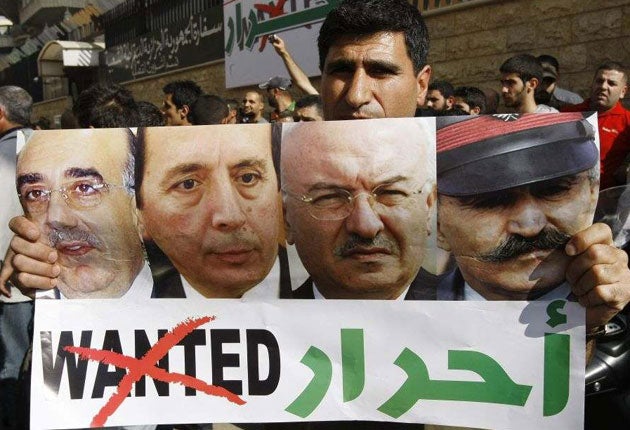Robert Fisk: Is this the price of America's new friendship with Syria?
World Focus: Pro-Damascus generals held for the assassination that sparked turmoil in Lebanon walk free after four years

Your support helps us to tell the story
From reproductive rights to climate change to Big Tech, The Independent is on the ground when the story is developing. Whether it's investigating the financials of Elon Musk's pro-Trump PAC or producing our latest documentary, 'The A Word', which shines a light on the American women fighting for reproductive rights, we know how important it is to parse out the facts from the messaging.
At such a critical moment in US history, we need reporters on the ground. Your donation allows us to keep sending journalists to speak to both sides of the story.
The Independent is trusted by Americans across the entire political spectrum. And unlike many other quality news outlets, we choose not to lock Americans out of our reporting and analysis with paywalls. We believe quality journalism should be available to everyone, paid for by those who can afford it.
Your support makes all the difference.They're out. The four top men blamed for the murder of the Lebanese ex-prime minister Rafiq Hariri in the Saint Valentine's Day massacre four years ago have been freed from their drab prison at Roumieh north of Beirut, amid a flurry of gunfire and fireworks. In Damascus – their home from home if you believe what Mr Hariri's men tell you – they must be drinking champagne.
Once more the UN donkey, clip-clopping on to the world stage after the murder of Mr Hariri, has been proved a mule. Judge Daniel Fransen, of the UN tribunal, declared in the Hague yesterday that the Big Four – how well we know their names in Lebanon – should go free: The Lebanese General Security commander Major-General Jamel Sayed, the former Internal Security director general Major-General Ali Haj, the ex-intelligence director general Raymond Aza and the former Presidential Guards commander Brigadier General Mustafa Hamdan.
There was much kissing and ululating among the relatives outside the north Beirut prison when Mr Fransen declared – quite correctly in law, it has to be added – that there was, after a four year investigation, "insufficient evidence" to continue the detention of the men. If this "evidence" existed (and the UN examined millions of phone calls recorded by British intelligence on Mount Troudos in Cyprus), then it failed to prevent the decision yesterday. Barack Obama's new friendship with President Bashar al-Assad of Syria must be going great guns.
Guns, unfortunately, may be the issue of the day, since Lebanon's national elections start on 7 June, when the growing Shiite-Muslim opposition, along with a weird Christian ex-General's party, threaten to collapse the Hariri-led bloc that has led the Lebanese government for four years, albeit with a year-old veto on cabinet decisions by Hizbollah. And here lies the problem. In five weeks' time, Hizbollah, the most loyal and the most security-conscious guerrilla movement in the Middle East – a new arrest in Lebanon of three alleged "spies" in the organisation attests to this – wants to depose the narrow majority of seats held by Mr Hariri's son, Saad, and his supporters (including the world's greatest nihilist, Walid Jumblatt, the Druze leader). Well, we shall see.
So who killed Rafiq Hariri? Until yesterday, the Lebanese, whose protests after the massacre forced the Syrian army out of Lebanon, thought they knew. And who was it who wanted, as President of the United States, to open a new door to the Syrians? President Obama. And who was it who stood next to Rafiq Hariri's son, Saad, in Beirut, three days ago, to assure him of US support? Why, Mr Obama's Secretary of State, Hillary Clinton, of course.
Join our commenting forum
Join thought-provoking conversations, follow other Independent readers and see their replies
Comments